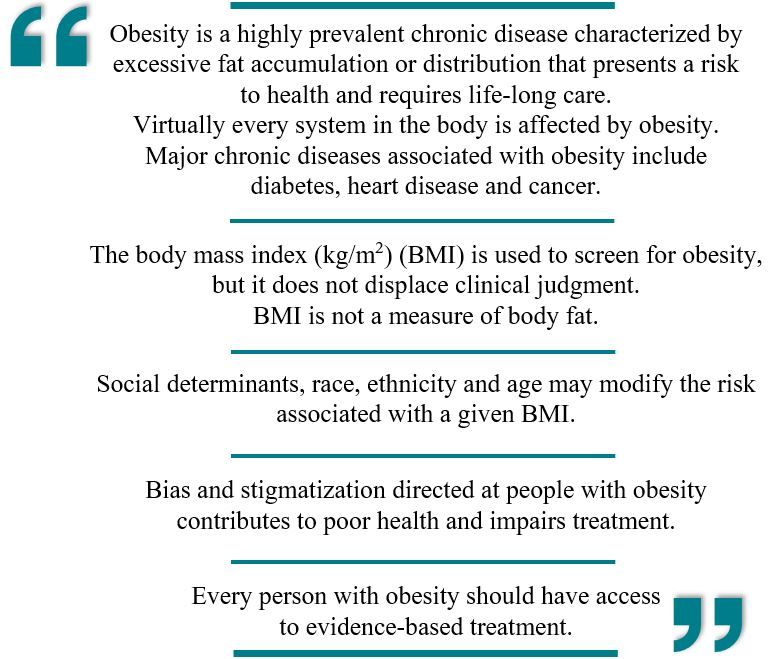- Clinical Technology
- Adult Immunization
- Hepatology
- Pediatric Immunization
- Screening
- Psychiatry
- Allergy
- Women's Health
- Cardiology
- Pediatrics
- Dermatology
- Endocrinology
- Pain Management
- Gastroenterology
- Infectious Disease
- Obesity Medicine
- Rheumatology
- Nephrology
- Neurology
- Pulmonology
US Obesity Care Organizations Release Consensus Statement
A consensus statement issued by the 6 organizations in the US whose shared mission is the prevention and treamtent of obesity underscores the chronic, relapsing nature of the disease; the impact of social determinants of health on absolute risk associated with obesity; inequties in access to evidence-based treatments; and the dangerous effects on health of bias and stigma aimed at persons with overweight and obesity.
The consortium describes the unified effort as essential to address the persistent roadblocks faced by each organization in the ongoing campaign to improve access to obesity treatment and reduce the myths and misinformation surrounding the disease.
Authoring organizations of the consensus statement are The Obesity Society, the Academy of Nutrition and Dietetics, American Society of Metabolic and Bariatric Surgery, Obesity Action Coalition, Obesity Medicine Association, the Strategies to Overcome and Prevent Obesity Alliance.
Consensus Statement

Leaders of the 6 organizations each offered comments in a statement:
"Our discussions led us to develop the consensus statement to give us a shared starting point for how we talk about obesity." Anthony G. Comuzzie, CEO, The Obesity Society
"Obesity is not the same in every person. There is a variability in response to all treatments for the disease. Similar to treating cancer, we need to approach the disease using multi-modal therapy to achieve the best long-term treatment of obesity. This includes medication, surgery, endoscopy, lifestyle changes and behavioral health interventions." Teresa LaMasters, MD, president, American Society of Metabolic and Bariatric Surgery
"Excess adipose tissue (body fat), particularly in certain locations of the body, is what contributes to the disease of obesity and its complications, and BMI alone should not be used to diagnose obesity."Angela Fitch, MD, president, Obesity Medicine Association
"No statement or discussion about obesity is complete without recognizing the impacts bias and stigma about obesity and body weight have on both the health and quality of life of people living with obesity. Blame and shame are not solutions to the obesity epidemic. I'm encouraged by the unified effort to address obesity, recognizing that we must eliminate weight bias and stigma." Joseph Nadglowski, president/CEO, Obesity Action Coalition
"Access to care for people with chronic diseases such as obesity is one of our top priorities." Of particular importance to the Academy is access to intensive behavioral therapy from RDNs – the food experts. We individualize treatment strategies as part of an interdisciplinary care team of qualified providers to help patients meet their health goals." Ellen R. Shanley, MBA, RDN, CDN, president, Academy of Nutrition and Dietetics
"In a health care system with increasing stratification between the haves and have-nots, access to care must include adequate treatment coverage for all patients by insurance providers. To date, insurers have taken widely different approaches in determining which treatment services are covered for their members, resulting in great inequities in care." Statement from the Strategies to Overcome and Prevent (STOP) Obesity Alliance
Additional information on each of the contributing organizations can be found in the statement published by The Obesity Society.
Related Content
Obesity Linked to Faster Alzheimer Disease Progression in Longitudinal Blood Biomarker Analysis
December 2nd 2025Article
Biomarker trajectories over 5 years in study participants with AD show steeper rises in pTau217, NfL, and amyloid burden among those with obesity, highlighting risk factor relevance.
